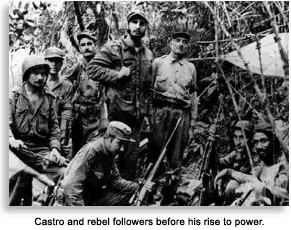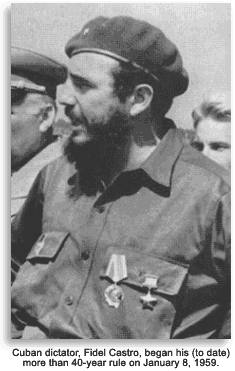Fidel Castro was a young Cuban lawyer when he decided to begin an armed struggle against dictator Fulgencio Batista in 1953. He failed at the time and was nearly killed, but lived to lead a second and successful rebellion. Those who hoped that Castro would become a democratic reformer, however, were disappointed when he instead became the hemisphere's longest-serving dictator.
Fidel Alejandro Castro Ruz was born on August 13, 1926, near Mayari, Cuba. His parents owned a sugarcane plantation and the family lived moderately prosperous lives. He attended Catholic schools and enrolled in the University of Havana in 1945, where he studied law. At the university, Castro joined groups opposed to the government. He received his law degree in 1950 and planned to run for a seat in the legislature, but his plans were frustrated when Batista overthrew the government and stopped the elections.
Castro charged Batista with violating the constitution, but his case was refused by the court. With political action impossible, Castro switched to violent opposition. On July 26, 1953, he led a group of armed rebels in an attack on the Moncada army garrison in Santiago. They were defeated by the army, which murdered dozens of the captured rebels in reprisal. Castro was sentenced to 15 years in prison.
 Following two years in prison, Castro was released by Batista as a gesture of reconciliation. Not at all reconciled, Castro left for Mexico to train a fresh rebel army. On December 2, 1956, they returned by boat. The army confronted them and they were defeated again, but this time Castro escaped into the mountains with a handful of supporters. From the mountains, they began to amass an army of more than 800 men and employed guerrilla military tactics that Bastista’s men were unequipped to handle. They began to win support among peasants, students, and even Catholic priests, from an additional propaganda campaign.
By the end of 1958, Castro had made Batista's position untenable. On the morning of January 1, 1959, the dictator left Cuba for the Dominican Republic, and from there to Madeira Island in Portugal, where he died. Castro entered Havana in triumph on January 8 to begin his more than 40-year rule. He promised to maintain the democratic constitution of 1940, but quickly imposed authoritarian socialist rule. Thousands of Batista supporters were executed, foreign holdings were confiscated, and American companies lost over a billion dollars in assets. On January 31, 1961, the United States imposed an economic embargo on Cuba. As a result, Cuba became more dependent on Soviet and Eastern bloc nations for economic aid. Many Cubans fled the island for the United States and some established an anti-Castro organization in Miami, Florida.
Stirrings of Castro’s overthrow began publicly when American presidential candidate John F. Kennedy criticized then president Dwight D. Eisenhower, during the 1960 presidential campaign, for not doing more about Castro. Kennedy decided early in his administration that Castro needed to be ousted, by force if necessary. He inherited a CIA plan for the Bay of Pigs Invasion from the Eisenhower administration and followed through on the covert attack in April 1961. Castro's military defeated the Cuban exiles and humiliated the United States. The United States got a measure of revenge the following year when they forced U.S.S.R. general secretary Nikita Khrushchev to withdraw Soviet missiles from Cuba during the October Cuban Missile Crisis.
Following two years in prison, Castro was released by Batista as a gesture of reconciliation. Not at all reconciled, Castro left for Mexico to train a fresh rebel army. On December 2, 1956, they returned by boat. The army confronted them and they were defeated again, but this time Castro escaped into the mountains with a handful of supporters. From the mountains, they began to amass an army of more than 800 men and employed guerrilla military tactics that Bastista’s men were unequipped to handle. They began to win support among peasants, students, and even Catholic priests, from an additional propaganda campaign.
By the end of 1958, Castro had made Batista's position untenable. On the morning of January 1, 1959, the dictator left Cuba for the Dominican Republic, and from there to Madeira Island in Portugal, where he died. Castro entered Havana in triumph on January 8 to begin his more than 40-year rule. He promised to maintain the democratic constitution of 1940, but quickly imposed authoritarian socialist rule. Thousands of Batista supporters were executed, foreign holdings were confiscated, and American companies lost over a billion dollars in assets. On January 31, 1961, the United States imposed an economic embargo on Cuba. As a result, Cuba became more dependent on Soviet and Eastern bloc nations for economic aid. Many Cubans fled the island for the United States and some established an anti-Castro organization in Miami, Florida.
Stirrings of Castro’s overthrow began publicly when American presidential candidate John F. Kennedy criticized then president Dwight D. Eisenhower, during the 1960 presidential campaign, for not doing more about Castro. Kennedy decided early in his administration that Castro needed to be ousted, by force if necessary. He inherited a CIA plan for the Bay of Pigs Invasion from the Eisenhower administration and followed through on the covert attack in April 1961. Castro's military defeated the Cuban exiles and humiliated the United States. The United States got a measure of revenge the following year when they forced U.S.S.R. general secretary Nikita Khrushchev to withdraw Soviet missiles from Cuba during the October Cuban Missile Crisis.
 Castro adopted the attitude that Cuba was "non-aligned" despite its close ties with other communist regimes around the world. He was elected head of Nonaligned Nations Movement and has been a strong voice against American imperialism. Until the fall of the Soviet Union, Cuba relied on Soviet subsidies to maintain its economy. With money received from sugar sales and economic aid from the Soviet Union, Castro implemented such social programs as his war on illiteracy and no-cost universal health care. Without their economic support, the Cuban economy has suffered, but Castro has maintained tight control. Castro's regime also has assisted with revolutions in Angola and Ethiopia.
From the American side, the economic embargo seems firmly in place, despite being supported by no other government in the world. The status quo seems likely to remain, at least until Fidel Castro finally passes from the scene.
Castro adopted the attitude that Cuba was "non-aligned" despite its close ties with other communist regimes around the world. He was elected head of Nonaligned Nations Movement and has been a strong voice against American imperialism. Until the fall of the Soviet Union, Cuba relied on Soviet subsidies to maintain its economy. With money received from sugar sales and economic aid from the Soviet Union, Castro implemented such social programs as his war on illiteracy and no-cost universal health care. Without their economic support, the Cuban economy has suffered, but Castro has maintained tight control. Castro's regime also has assisted with revolutions in Angola and Ethiopia.
From the American side, the economic embargo seems firmly in place, despite being supported by no other government in the world. The status quo seems likely to remain, at least until Fidel Castro finally passes from the scene.